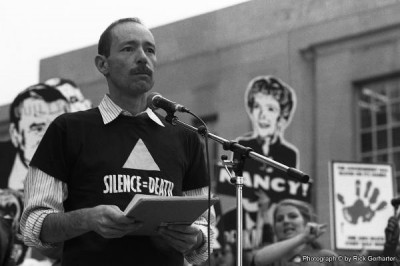| Reviews & Columns |
|
Reviews DVD TV on DVD Blu-ray 4K UHD International DVDs In Theaters Reviews by Studio Video Games Features Collector Series DVDs Easter Egg Database Interviews DVD Talk Radio Feature Articles Columns Anime Talk DVD Savant Horror DVDs The M.O.D. Squad Art House HD Talk Silent DVD
|
DVD Talk Forum |
|
|
| Resources |
|
DVD Price Search Customer Service #'s RCE Info Links |
|
Columns
|
|
|
Vito

Reviewed at the 2011 New York Film Festival
Jeffrey Schwarz's Vito does not start promisingly--the structure is staggeringly standard, opening with a sweeping pre-title montage assuring us of the importance of the subject before proceeding into a cradle-to-the-grave, A-followed-B-followed-C biographical portrait. But the story being told sweeps us in so quickly and confidently that we quickly forget the predictable way in which it's being told; when you've got a subject this compelling, they style doesn't have to blow our minds.
That subject is Vito Russo--"first and foremost," one of those pre-title talking heads announces, "an activist." Among gay activists, he is remembered for his crucial involvement in the Gay Activists Alliance and GLAAD (which he co-founded); among film fans, he is the rock star who wrote The Celluloid Closet, the invaluable 1981 mediation on homosexual representation in cinema history.
Vito's early years are dramatized via terrific archival footage that serves as a crash course in the history of the gay rights movement and how it shook mainstream culture. The familiar milestones are marked (Stonewall), along with lesser-known moments (the GAA "zap" demonstration at the office of a New York County Clerk who announced his distaste for gay marriage--a few decades before its time) and the slow fusing of Vito's two loves--activism and cinema--with his "movie nights" of rarely screened musicals, dramas, and camp classics.
Much of the footage really is astonishing, beautifully cut and smoothly incorporated (the picture moves quickly and nimbly), often to help show rather than tell--as with the incredible black and white video of a 1973 gay rights rally, which serves to illustrate the fracturing and splintering of the movement. As those drifts occurred, Russo grew more obsessed with his work at the archives of the Museum of Modern Art's film department, where he began finding forgotten images of homosexuality in classic cinema, becoming "a Sherlock Holmes, on this detective journey."
The strong middle section details how he researched and assembled The Celluloid Closet, first as a multimedia presentation, then as the bestselling book. The details of the book's impact, and his rise as are cultural commentator, are fascinating; so are the clips from the films in question, though Schawrz unwisely repeats much of the material we've already seen in the outstanding 1995 documentary adaptation of the book.
Vito's third act gets more personal, first with the story of his love affair with Jeffrey Sevcik, then with the sudden and terrifying appearance on the scene of AIDS (first known as GRID, or "the gay pneumonia," or "the gay cancer") and the subsequent panic as Russo watched his friends dropping like flies--followed by the rage over a hidebound far-right government that refused to acknowledge the epidemic, much less address it. Kramer had been a gay rights activist, and now he transitioned into an AIDS activist. "People are dying of homophobia," he fumed. "People are dying of Jesse Helms. They're dying of Ronald Reagan."
Russo, of course, had a personal stake in the matter. Sevcik succumbed to the disease in 1986, by which time Russo had tested positive as well, and he spent the last four years of his life raging against the FDA (for overpriced and/or unavailable medication), the New York Post (for fear and hate-mongering AIDS stories), and other worthwhile targets.
His is an enormously inspiring story--one that is not often told. The ACT UP demonstrations are given ample screen time (and lent the power of rousing music and razor-sharp cutting), and for good reason; these were demonstrations that got results, that changed things, that made an impression. Late in Vito, the filmmakers show Russo speaking at a big, important rally, and Scwarz goes to great pains to fill in the backstory: Russo was sick, was weak, was for all practical purposes dying. But he went to that microphone, and he rallied the troops. Watch that scene without misting up. I dare you.
Jason lives in New York. He holds an MA in Cultural Reporting and Criticism from NYU.
|
| Popular Reviews |
| Sponsored Links |
|
|
| Sponsored Links |
|
|
| Release List | Reviews | Shop | Newsletter | Forum | DVD Giveaways | Blu-Ray | Advertise |
|
Copyright 2024 DVDTalk.com All Rights Reserved. Legal Info, Privacy Policy, Terms of Use,
Manage Preferences,
Your Privacy Choices | |||||||











